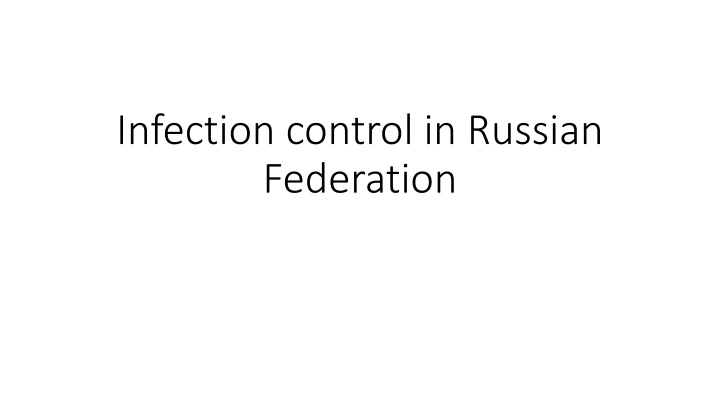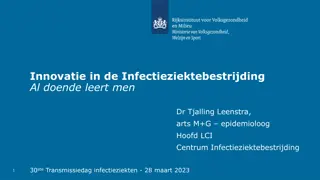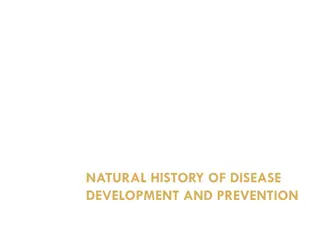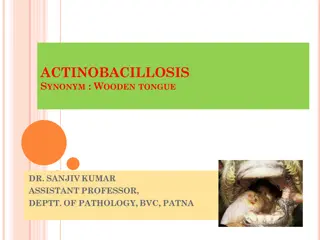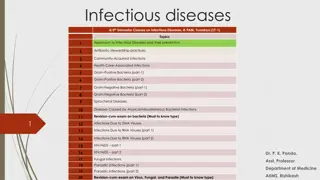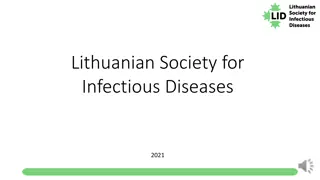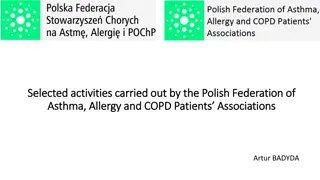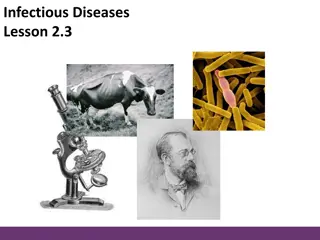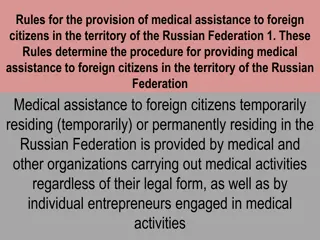Infectious Disease Control in the Russian Federation
Infection control in the Russian Federation is managed by various agencies and organizations, with a focus on surveillance, prevention, and outbreak response. The country registered millions of cases of infectious diseases, with upper respiratory tract infections being prevalent. The anti-plague service of Rospotrebnadzor plays a crucial role in preventing and managing outbreaks, especially concerning the plague and other dangerous infectious diseases. Collaboration with neighboring countries is essential to prevent disease importation.
Download Presentation

Please find below an Image/Link to download the presentation.
The content on the website is provided AS IS for your information and personal use only. It may not be sold, licensed, or shared on other websites without obtaining consent from the author.If you encounter any issues during the download, it is possible that the publisher has removed the file from their server.
You are allowed to download the files provided on this website for personal or commercial use, subject to the condition that they are used lawfully. All files are the property of their respective owners.
The content on the website is provided AS IS for your information and personal use only. It may not be sold, licensed, or shared on other websites without obtaining consent from the author.
E N D
Presentation Transcript
Infection control in Russian Federation
Population 146,2 mln 85 the subjects of the Russian Federation
Infectious diseases in the Russian Federation In 2016, the Russian Federation registered 34 million 880 thousand 736 cases of infectious and parasitic diseases
Infectious diseases in the Russian Federation The leading place in the structure of infectious and parasitic diseases in 2016, as in previous years, occupy acute infections of the upper respiratory tract of multiple and unspecified localization.
Epidemiologic surveilance President of RF Prime Minister of the Russian Federation Rospotrebnadzor (Sanitary and Epidemiological Agency) Roszdravnadzor Ministry of Health (Health inspection Agency)
Rospotrebnadzor (Sanitary and Epidemiological Agency) Administration of the Federal Service of Rospotrebnadzor Administration of the Federal Service of Rospotrebnadzor in each subject of the Russian Federation Centers of Hygiene and Epidemiology in each subject of the Russian Federation Research institutes Antiplague facilities Office Rosprtrebnadzor departments (Ministry of Internal Affairs, Ministry of Defense and others)
Outbreak response and manage on the example of the plague Russia's anti-plague service of Rospotrebnadzor a network of specialized health facilities designed to provide scientific and practical support to the state sanitary and epidemiological surveillance for the protection of the Russian population from the occurrence and spread of plague, as well as in the area of sanitary protection of the territory of Russia, the prevention of especially dangerous and natural focal infectious diseases, etiology. In particular, regular observations of endemic plague areas are conducted to prevent cases of plague, as well as to study the circulation of plague microorganisms in its natural media (ground squirrels, tarbagans, etc.). In addition, an important function of Russia's antiplague service is to prevent the importation of disease from economies that are unsuccessful in the plague, including Kazakhstan, China and Mongolia, that is, economies directly bordering Russia.
Outbreak response and manage on the example of the plague In the case of the plague, the general management of measures to localize and eliminate the epidemic focus of single, group and mass cases of the plague population is carried out by an interdepartmental sanitary and epidemiological commission created by the decision of the administration of the district, city, region, province, republic and acting on an ongoing basis.
Outbreak response and manage on the example of the plague In the epidemic outbreak of the plague, in accordance with a comprehensive plan, measures to prevent the spread of infectious disease are organized and conducted by the bodies and institutions of Rospotrebnadzor in cooperation with the executive authorities, including health care, medical organizations, institutions of the Russian Federation in veterinary medicine, with the advisory- methodical and practical assistance of anti-plague institutions.
Medical organizations provide (on the example of the plague) Identification of patients with symptoms of the plague and providing them with medical care; timely notification of the Office (territorial department) of Rospotrebnadzor for the subject of the Russian Federation, an antiplague facility for all cases of suspected plague among the population; deployment of the hospital base in the epidemic hotbed of the plague in accordance with a comprehensive plan for sanitary protection of the territory; organization of transportation of patients by specialized transport, their hospitalization, clinical and epidemiological examination, treatment, as well as disinfection at the place of identification of patients; provisional admission of all patients with signs of plague (patients with fever, lymphadenitis, pneumonia); isolation of patients who were in contact with the patient for a period of incubation with medical surveillance and emergency prevention of plague; Observation of persons in the observatory (upon application of quarantine); pathological anatomical opening in cases
Clinical and diagnostic laboratories provide (on the example of the plague) study of the material from patients (general blood test, general urine analysis, biochemical blood test), with suspicion of plague, according to vital signs, in accordance with the approved plan for reprofiling the laboratory, which ensures compliance with the requirements of sanitary regulations for the safety of work with pathogens of Groups I-II pathogenicity (hazard), under the supervision of specialists of an antiplague institution.
Outbreak response and manage on the example of the plague When patients with bubonic plague form are identified, antiepidemic (preventive) measures are introduced in the epidemic focus, when quarantine patients are diagnosed with a pulmonary form of a plague, quarantine is introduced. Quarantine is introduced throughout the territory of a constituent entity of the Russian Federation or in the territory of certain regions, cities, populated areas of a given subject of the Russian Federation.
EBOLA Russian epidemiologists participated in the elimination of the outbreak of Ebola in Africa Within the framework of the Russian Federation's participation in the global efforts to reduce the risks of epidemics of dangerous infections like Ebola, Rospotrebnadzor, the Russian-Guinea Research Center for Epidemiology and the Prevention of Infectious Diseases was established in Guinea. Phase 2 of the clinical trials of the vaccine against Ebola (EpiVa Ebola)
Goal : continuous medical education plan for conducting a workshop on training specialists in work during outbreaks 1 level students of senior courses who study at the Department of Infectious Diseases specialty infectious Diseases doctors of hospitals and polyclinics 2 level postgraduate education residents other specialties Graduate students
calendar of behavior of events 1 month : to develop a workshop plan to make presentations for lectures and practical classes for physicians of various levels of training 12 month: o conduct a study on the basis of an infectious hospital for work during the outbreak of the plague 3 monht: hold seminars in accordance with the developed program for students and residents 6 month: hold seminars in accordance with the developed program for doctors from different regions of the economy
